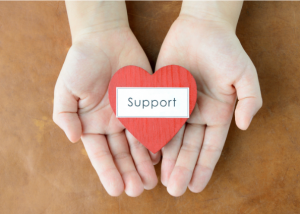
Get What You Need
At some time, each individual involved in your life will need something different from each other. It should be possible for everyone to receive support based on their needs.
What You Might Need From Others
 You will need ongoing love and support from your family and friends. Some of the support needed will change as your condition changes. These are some support measures you may need from your loved ones and how you may get it.
You will need ongoing love and support from your family and friends. Some of the support needed will change as your condition changes. These are some support measures you may need from your loved ones and how you may get it.
- It is important to have ongoing contact with others. Give loved ones permission to visit as often as you are comfortable with.
- You need continued emotional support from your loved ones. Sharing your feelings openly with them encourages this. They will likely be experiencing their own grief, so don’t expect them to be positive all the time.
- Your loved ones should continue to affirm your life. Focusing on the good times during visits will help this.
- You may need continuing reassurance about many issues to better ease anxieties, including that you are not a burden, they will continue to stick with you through your illness, and/or they will accept your death and carry your memory.
- Sometimes it helps if they give you permission to let go.
Your Palliative Care/Hospice team will provide empathy and will work to make sure you always feel in control of your circumstances.
They will be able to provide or refer you for individual, family, and/or group therapy with a qualified counselor, medication to relieve depression and anxiety, and other medical treatments to make you comfortable. They can also help you arrange other things, such as financial and legal consults, advance directives, estate planning, funeral and burial services, medical insurance, or support groups.
Don’t let guilt, reluctance, or ambivalence prevent you from accepting the help you need.
What Your Loved Ones Need To Do for You
Despite the emotions your family and friends are feeling, they must try and put them aside while they support you. While there can be some mutual support, they must focus on your needs if they choose to be with you in these trying times.
- Your loved ones need to spend as much time with you as they can. They should ask you how you’re doing, what you need, and allow you to talk about your life. Whether they talk to you, read to you, watch movies with you, just listen to you, or simply sit and hold your hand, it is their company that is most important.
- They may need to ground you if you experience changes in sensory perception that result in delusions or hallucinations.
- As you are supporting each other, it is natural for them to share their feelings of fear, sadness, and loss with you. However, it is important that they don’t burden you with these feelings.
- Don’t be reluctant to express your fears of death, which can help you come to terms with the fact that you are dying. They may want to express their feelings or offer reassurances, but it is best if they just listen without interrupting.
- Medical professionals should not be informing your loved ones about your situation before telling you, unless you are unable to comprehend it. If it does happen, they should share any information with you, no matter how difficult, as soon as you are able to understand what it means.
- Your loved ones need to reassure you that they will honor your wishes as outlined in your advance directives and living wills, even if they seriously object to them.
- If you need some time to be alone, they should respect your need to establish barriers. However, they should assure they will be there if needed.
What Your Loved Ones Need
 The most important things you can do for your family and friends are to let them know you love them, allow them to stay involved in your life, and keep them fully informed about your prognosis. To help with keeping them involved, you may want to allow your Palliative Care/Hospice team to share information with them, but only after they have given it to you.
The most important things you can do for your family and friends are to let them know you love them, allow them to stay involved in your life, and keep them fully informed about your prognosis. To help with keeping them involved, you may want to allow your Palliative Care/Hospice team to share information with them, but only after they have given it to you.
Allow them to help you in any way they are comfortable with, while not pushing them to do things that they would find difficult to do. Acknowledge their role in supporting you and your understanding of what they are going through.
Although your family and friends may require significant support during this time, it is not your role to set aside your needs to provide it. They need to seek out others and/or professional counselors to help them deal with their feelings and begin to accept the reality of your death.
See the Dealing with Grief section for more details.
Saying Goodbye
The last important task is to find a way to say goodbye. A final farewell is not easy and often involves reluctance. However, if your loved ones miss the chance to do this properly, they may regret it for the rest of their lives. Since death may not be predictable, many of your loved ones should prepare to say goodbye well in advance of your death, although it does not mean they wouldn’t continue to visit you.
Most loved ones may prefer saying goodbye to you in person and while alone with you, but this is not always possible. While your death may be predictable and slow enough to allow you to spend time with each individual or arrange for the family to get together, it may happen quickly and require a different approach.
- If time and opportunity allow, your family and friends could take turns with you. This is your chance to express your love and appreciation for each other, and say any last things that are necessary for closure.
- If this is not possible, other types of communication can be used for people who may be out of town or traveling, such as phone calls, video apps such as FaceTime or Skype, or other technology.
- Even if you are not conscious, your loved ones can be reassured that you may still be able to sense they are there and hear them say goodbye.
- If anyone is having a lot of trouble with this, it may help to talk with a counselor or clergy beforehand.
It is likely that your closest family will want to be there with you. However, if they are not, it does not reflect on what they feel about you or what type of person they are. Being with someone when they die, found on the Dying Matters website, describes what they may expect if they choose to do so.
